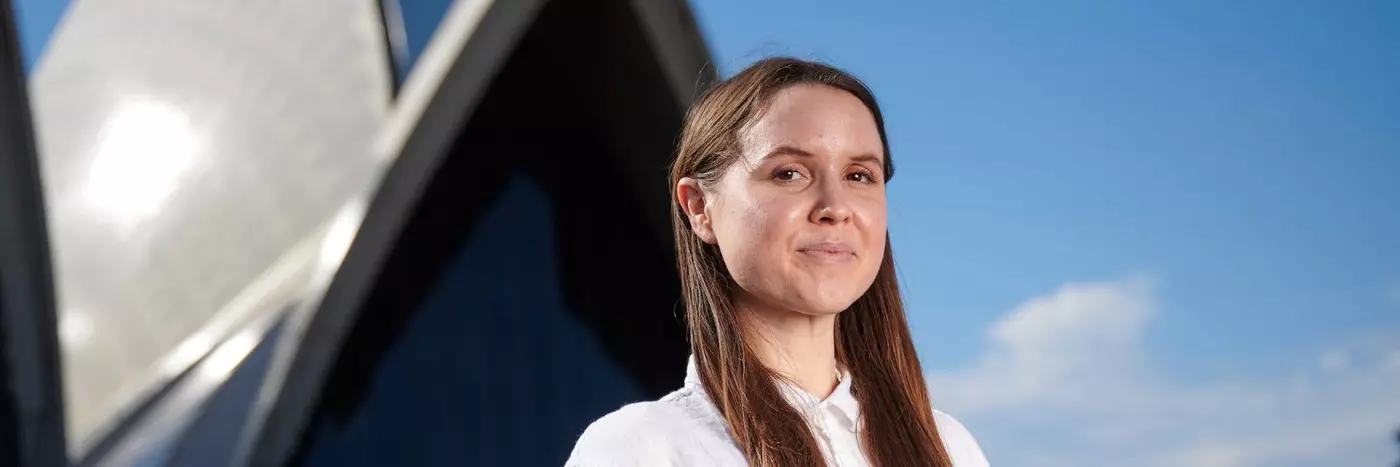Up Next
Join host Courtney Ammenhauser as she chats to a spectacular lineup of artists from a variety of creative disciplines as they make their way to one of the most famous performance venues in the world. Hear from effervescent Fangirls creator Yve Blake, spellbinding Dorr-e Dari actor Mahdi Mohammadi and heaps more in this playful interview series that’ll introduce you to Australia’s future arts and culture leaders.
Genre bending with contemporary cellist James Morley
Season
1
- Episode
12
22
min
22
sec
Switzerland-based Australian cellist, James Morley, has been described as a “new generation virtuoso.” But over on his website, he describes himself as simply “cellist/improviser/etc” and his Instagram handle is @durrie_butts. That humility really comes through in this episode. While James works largely as a classical soloist and chamber musician, he frequently finds ways to bring cello music into unexpected spaces and genres.
Dancing in Digital Dimensions: Next gen choreography with Harrison Hall
Season
1
- Episode
11
20
min
47
sec
As a dancer and choreographer, Harrison Hall pushes the boundary of what those artforms mean. Think drones filming dancers in motion capture body suits. Think live performance transposed into video game avatars for people watching on the other side of the world. Think dancers that don't all look like ballerinas.
Sacrifice, social media and side hustles with Ashli
Season
1
- Episode
10
22
min
12
sec
With a gift for lush, melodic vocals wrapped around irresistibly slinky hooks, emerging singer-songwriter Ashli delivers sparkling, R&B-flavoured pop. In this episode, Ashli chats with Courtney about: how a pop song is made, her love-hate relationship with social media, how church music and Taylor Swift inspire her, and so much more.
Weaving a tapestry with Jazz Money
Season
1
- Episode
9
30
min
57
sec
As a young person roaming the bush, award-winning Wiradjuri poet, filmmaker and artist Jazz Money couldn’t have imagined a career performing and making poetry for the Opera House. In this episode of Up Next, Jazz and Courtney chat about the experience growing up as the weird kid in regional Australia, how to make poetry more accessible and everyday poetics.
Ziggy Ramo The Storyteller
Season
1
- Episode
8
34
min
32
sec
Over the years, Ziggy Ramo has basically made a second home out of the Opera House. Now he's back again to chat about his new album, Sugar Coated Lies, his recent turn as an actor and co-composer in the Australian drama Black Snow, and why he's switching out rapping for folk music.
Another one woman show with Liz Kingsman
Season
1
- Episode
7
25
min
7
sec
When writer and actor Liz Kingsman created her meta-theatrical parody of the classic contemporary “one woman show”, she perfectly filled a need we didn’t know we had. Here she chats about leaving Sydney to find her comedic home in the UK, and the quirks of making satirical theatre that equally tickles and baffles audiences.
The symphony of soul with Ngaiire
Season
1
- Episode
6
26
min
29
sec
In November 2022 creator, singer, songwriter Ngaiire performed with the Sydney Symphony Orchestra at the Opera House forecourt. Catching a glimpse of the nerves and excitement, Ngaiire sat with Courtney ahead of the show, sharing all the lessons learnt in her career in music, how her life experiences have shaped her art and how this performance has her mum crying tears of joy.
Character building with Lily Balatincz and Rahel Romahn
Season
1
- Episode
5
32
min
31
sec
In a new Australian run of Peter Shaffer’s play Amadeus, Lily Balatincz and Rahel Romahn play Wolfgang Amadeus Mozart and Constanze Mozart. Amidst rehearsals, Lily and Rahel talk to Courtney about the life-changing experiences that shifted their careers, how they connect with their characters, and what it means to share the stage with legendary actor Michael Sheen.
Getting in the mood for love with Rainbow Chan
Season
1
- Episode
4
40
min
41
sec
Courtney has a heart-to-heart with vocalist, producer and interdisciplinary artist Rainbow Chan. They get cosy and chat all about her performance in an ode to Wong Kar-wai’s cinematic masterpiece In the Mood, her artistry, and share stories about love and loss and how to find comfort in times of heartache.
Facing demons with Michael Mohammed Ahmad
Season
1
- Episode
3
32
min
37
sec
Courtney talks with the Western Sydney writer, playwright and founder of Sweatshop Literacy Movement, ahead of the opening of his new play, The Demon. They dive deep into his short-lived acting career, his creative journey from novels to plays, and what it means to have his communities represented on the stages of the Opera House.
Pearls of wisdom with Mahdi Mohammadi
Season
1
- Episode
2
26
min
20
sec
Mahdi Mohammadi offers lessons in love and activism from his feminist theatre roots in Afghanistan. Courtney sits down with the co-divisor and performer in Dorr-e Dari: A Poetic Crash Course in the Language of Love ahead of its season at the Sydney Opera House. Together they journey back to Mahdi’s beginnings in Afghanistan, reveal the biggest lie he ever told his dad, and discuss what it means to him to have performed at the House - twice!
Fangirling with Yve Blake
Season
1
- Episode
1
30
min
53
sec
What do Mount Franklin bottles and Harry Styles have in common? Fangirls. Courtney meets playwright, screenwriter, songwriter, and beloved creator of the hit musical Fangirls, Yve Blake. They chat about her overnight success, the Fangirls of Fangirls, and the sacred Mount Franklin bottle that touched Missy Higgins’ lips.
